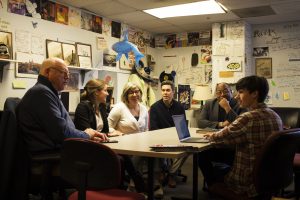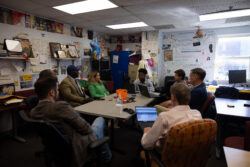Alaskan Senator Lisa Murkowski (COL ‘80) spoke on climate change, gun violence, and the need for bipartisanship at an event hosted by GU Politics and GU College Republicans on April 23.
Alaska native Larisa Pollock (MSB ‘19) introduced Murkowski, citing her work on environmental protection and infrastructure as critical to the interests of Alaskans.
“When I was in eighth grade, Senator Murkowski won a historic write-in campaign. Many Alaskans, myself included, will never forget how to spell her name,” Pollock said. “I am very proud that she is my senator, and a Hoya as well.”
Murkowski, who won the Funniest Human at Georgetown Competition during her time as an undergraduate, is the first Alaskan-born senator and the 33rd woman ever to serve in the U.S. Senate. Murkowski noted that there are currently a record 23 female senators, but despite these growing numbers, there is still room for improvement in terms of gender equality.
Murkowski praised Georgetown for its commitment to Dreamers, who have been left with an uncertain future after President Donald Trump moved to end the DACA program.
“I want to give a shout-out to Georgetown for their advocacy for the young people, whether they be students here at Georgetown or around the country, who have been impacted by, literally, this purgatory that they are in now,” Murkowski said.
Murkowski said that recently the Senate has been overwhelmed by new cabinet and judicial appointment confirmations from the Trump administration.“That has consumed a great deal of the Senate’s time. In the meantime, what has happened is a great deal of focus on what is not getting done,” Murkowski said.
According to Murkowski, there has been a proliferation of political “head-butting” and lack of cooperation. She said this has prevented Congress from passing even non-controversial bills, such as Coast Guard Reauthorization legislation.
Murkowski’s solution for bipartisan cooperation is simple: talking to one another.
“Legislating, by its very definition, is finding that compromise, taking the good ideas that one has and combining them with other good ideas,” Murkowski said. “The Republicans certainly don’t have the monopoly on good ideas and I don’t think the Democrats do either.”
She recalled meeting with victims’ families after the Sandy Hook Elementary School shooting and exchanging different perspectives on gun control. “We had conversation, because they couldn’t wrap their head around the fact that in my family, when a kid turns eight, boy or girl, that’s when you started going out hunting,” Murkowski said.
“For them to have that conversation with me and for me to hear where they come from, we have to respect that in one another,” Murkowski said. “I think that we’re failing to respect where people are coming from and we’re just looking at the party label.”
Another issue important to Murkowski and her constituents is climate change. Murkowski said she was often discouraged by the views of her Republican colleagues on the issue and their unwillingness to discuss it. According to Murkowski, Republicans must address climate change for the sake of the party’s future, because if they do not they will not have a chance at garnering support from young voters.
“If you believe that climate change is not happening, I need you to come to Alaska. I need you to see what I am seeing,” Murkowski said. “I need you to listen to the native people who have been in the same area for thousands of years and who will share their stories.”
C.C. Borzilleri (COL ‘19), a fellow with the Georgetown Women’s Alliance, gave closing remarks, citing Murkowski as an important role model for conservative women.
“Senator Murkowski is a shining example of an alum who has gone forth to be a woman for others and a career public servant,” Borzilleri said. “[Murkowski’s] courage to govern according to [her] principles is a model for all of us.”







“We had conversation, because they couldn’t wrap their head around the fact that in my family, when a kid turns eight, boy or girl, that’s when you started going out hunting,”
That’s actually extremely normal in many parts of the country, especially smaller towns. My father first took me hunting when I was around 10 and nothing bad happened out of this(except money I’m spending every year on stuff like ammo, tags and beretta clothing :D )
That is all the helpful information I needed. I appreciate you sharing.